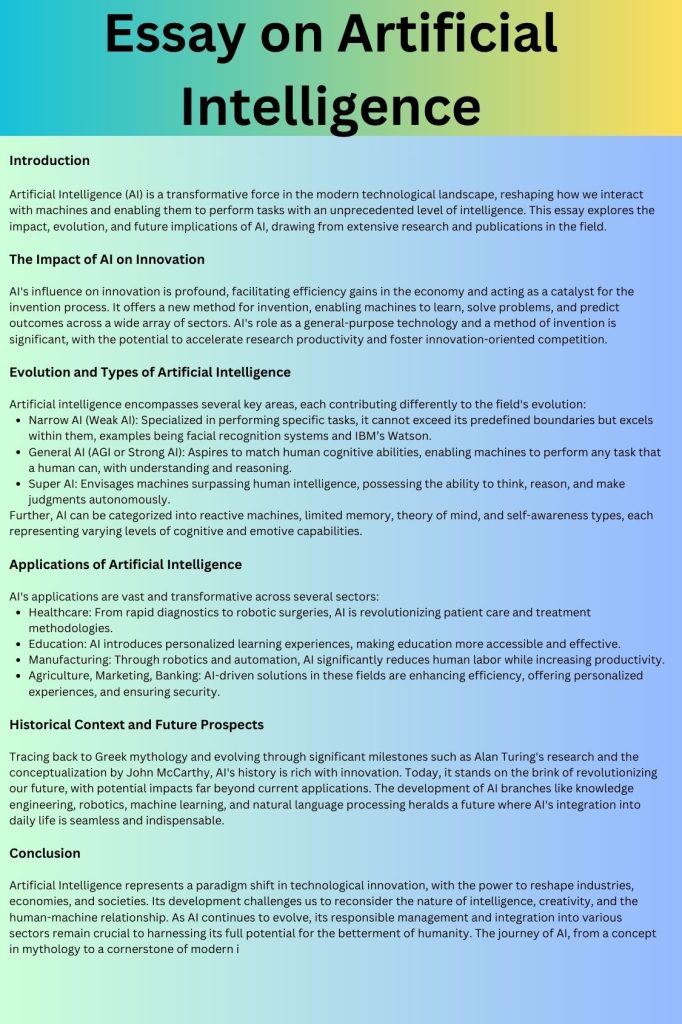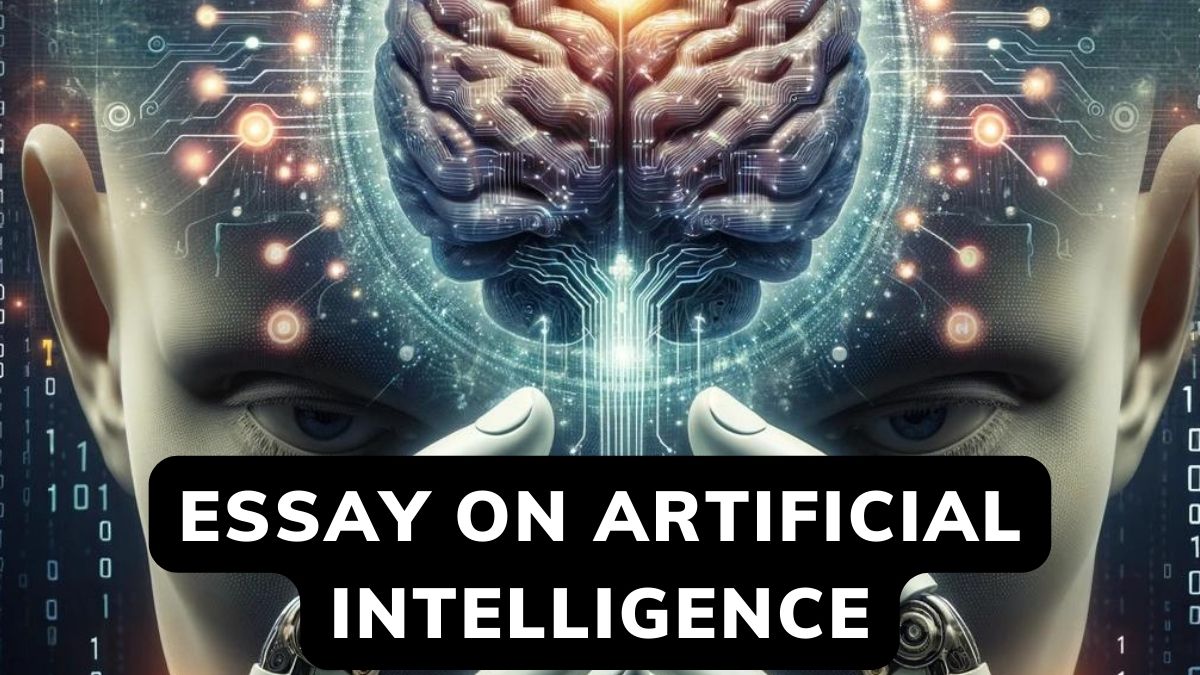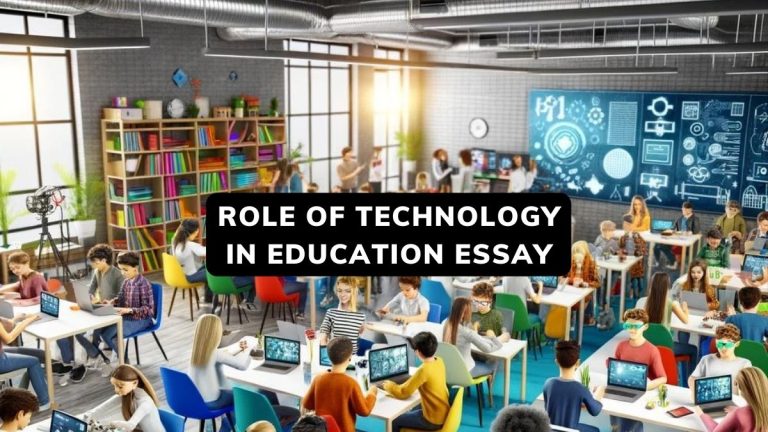Essay on Artificial Intelligence 100,150,1000 Words
Imagine a world where machines not only think but also learn, adapt, and make decisions – a future not just imagined but being built today through Artificial Intelligence (AI). This technological leap has already started to reshape our lives, industries, and societal structures, offering solutions as much as it presents new challenges. In this essay, we embark on a journey to explore the essence of AI, its transformative applications across various domains, and the ethical considerations it raises, setting the stage for a comprehensive understanding of this complex and dynamic field.
Essay On Artificial Intelligence 100 Words
Artificial Intelligence (AI) marks a pivotal advancement in technology, simulating human intelligence in machines to perform tasks from simple to complex. It encompasses areas like machine learning, where machines improve from experience, and natural language processing, facilitating human-computer interaction. AI’s applications span various sectors including healthcare, where it enables faster diagnostics and personalized treatment plans, and education, offering customized learning experiences. Despite concerns about job displacement, AI promises efficiency gains and innovation, reshaping industries and enhancing human capabilities. As AI continues to evolve, it opens up new frontiers for exploration, making it a cornerstone of future technological advancements and a catalyst for societal change.
Essay On Artificial Intelligence 150 Words
Artificial Intelligence (AI) represents a revolutionary leap in the capability of machines, enabling them to mimic human cognition and perform tasks ranging from simple data analysis to complex problem-solving. This technological marvel has found applications in various fields, transforming healthcare through predictive diagnostics and personalized treatment plans, revolutionizing education by providing tailored learning experiences, and optimizing manufacturing processes through robotics and automation. AI’s evolution is marked by developments in machine learning, robotics, and natural language processing, driving innovation and efficiency across sectors.
However, the rise of AI also poses ethical and societal challenges, including privacy concerns and job displacement. Despite these challenges, AI holds immense potential for advancing human knowledge and solving complex global issues. As we navigate its implications, the focus must be on harnessing AI responsibly, ensuring it serves to enhance, rather than detract from, the human experience.
Essay on Artificial Intelligence for Class 8
Artificial Intelligence, or AI, is a fascinating area of technology where machines are designed to think and act like humans. Imagine robots that can solve puzzles, voice assistants on your phone that understand what you say, or even computer programs that can predict the weather accurately. That’s AI at work!
What is Artificial Intelligence?
AI is the science of making smart machines. It’s about creating computers and robots capable of solving problems, making decisions, and learning from experience, just like we do. This might sound like something from a science fiction movie, but AI is very much a part of our daily lives. From playing chess against a computer to getting recommendations on what to watch next on TV, AI is everywhere.
How Does AI Work?
AI works by processing large amounts of data and learning from it, a process known as machine learning. For example, by looking at thousands of cat pictures, an AI can learn to identify photos of cats. AI systems can also improve through experience, getting better at tasks the more they do them, just like humans.
Applications of AI
AI has many exciting applications that make our lives easier and more efficient:
- Education: AI can create personalized learning plans for students, helping them learn at their own pace.
- Healthcare: AI is used in diagnosing diseases from medical images and can even help in creating personalized medicine.
- Entertainment: Streaming services use AI to recommend movies and shows based on what you’ve watched before.
- Home Automation: AI powers smart home devices like thermostats and lights that adjust automatically to your preferences.
Advantages of AI
AI offers many benefits, such as:
- Efficiency: AI can process information much faster than humans, making it invaluable for tasks like data analysis.
- Accuracy: AI systems can achieve a high level of accuracy in tasks like medical diagnosis, reducing human error.
- Automation: AI can take over repetitive tasks, freeing up humans for more creative work.
Challenges and Ethical Considerations
While AI has many benefits, it also poses some challenges:
- Job Displacement: As AI takes over more tasks, there are concerns about the loss of jobs, especially in industries that rely heavily on manual labor.
- Privacy: AI systems often need to process personal data, raising concerns about privacy and data security.
- Bias: If the data AI learns from is biased, the AI’s decisions can also be biased, leading to unfair outcomes.
The Future of AI
The future of AI looks promising and exciting. We can expect more intelligent AI systems that can perform complex tasks, from driving cars to helping doctors make better treatment decisions. However, it’s also essential to address the challenges and ensure that AI benefits everyone.
Conclusion
Artificial Intelligence is a rapidly growing field with the potential to transform every aspect of our lives. By understanding AI and its implications, we can make the most of its benefits while navigating its challenges wisely. As we look to the future, the possibilities of what AI can achieve are virtually limitless, promising a world where technology and human ingenuity come together to create a better tomorrow.
Essay On Artificial Intelligence 1000 Words
Introduction
In the contemporary digital era, Artificial Intelligence (AI) has emerged as a defining force of technological advancement. This essay delves into the multifaceted realm of AI, exploring its evolution, applications, ethical considerations, and future potential.
Evolution of Artificial Intelligence
Artificial Intelligence, the simulation of human intelligence by machines, has a history that intertwines with the quest for creating artifacts that not only think but also learn and adapt. The journey began in the mid-20th century when pioneers like Alan Turing questioned the potential for machines to think. The subsequent decades saw the development of the foundational pillars of AI, including machine learning, natural language processing, and robotics, leading to the creation of systems capable of performing tasks that typically require human intelligence.
Applications of AI
Today, AI’s applications are vast and varied, touching almost every aspect of human life. In healthcare, AI algorithms assist in diagnosing diseases with precision akin to, and sometimes surpassing, human doctors. The advent of personalized medicine, powered by AI, promises treatments tailored to individual genetic profiles. In education, AI systems provide personalized learning experiences, adapting to each student’s pace and style of learning, making education more accessible and effective. In the realm of environmental conservation, AI aids in monitoring climate change, predicting weather patterns, and optimizing energy consumption, thereby playing a crucial role in combating global warming.
AI’s influence extends to the automotive industry through the development of autonomous vehicles, promising to revolutionize transportation by improving safety and reducing traffic congestion. In the entertainment industry, AI algorithms curate personalized content recommendations, enhancing user experiences on streaming platforms.
Ethical Considerations
Despite its vast potential, AI’s ascent raises significant ethical and societal concerns. The automation of jobs through AI poses a threat to employment in various sectors, necessitating strategies for workforce adaptation and reskilling. Privacy issues emerge as AI systems require vast amounts of data, often personal, to learn and make decisions, highlighting the need for robust data protection measures.
The development of autonomous weapons systems presents moral dilemmas regarding the delegation of life-and-death decisions to machines. The potential for AI to exacerbate social inequalities is another concern, as those with access to AI technology gain disproportionate advantages.
The Future of AI
Looking ahead, AI’s trajectory is poised to further intertwine with human life. The pursuit of General AI, systems with the ability to understand, learn, and apply intelligence across a broad range of tasks, remains a horizon to be reached. As AI systems become more sophisticated, they could enhance human capabilities, leading to unprecedented levels of creativity and innovation.
The integration of AI in tackling global challenges, such as healthcare, environmental conservation, and education, holds promise for significant societal benefits. In healthcare, AI could lead to breakthroughs in understanding complex diseases, paving the way for novel treatments. In the fight against climate change, AI’s predictive capabilities could optimize energy use and reduce emissions, contributing to sustainability efforts.
Ethical AI and Governance
The realization of AI’s full potential necessitates a concerted effort to address its ethical implications. Establishing global standards and frameworks for the ethical development and deployment of AI is critical. This includes ensuring transparency in AI algorithms, fostering accountability for AI decisions, and promoting an inclusive approach to AI development that considers diverse perspectives and mitigates biases.
Conclusion
Artificial Intelligence stands at the forefront of technological evolution, offering transformative possibilities across various domains. As AI continues to evolve, it presents a unique blend of opportunities and challenges. By navigating these with a focus on ethical considerations and societal well-being, humanity can harness AI’s potential to foster a future marked by enhanced human-machine collaboration, innovative solutions to complex problems, and inclusive growth. As we embark on this journey, the collective goal should be to steer AI development in a direction that amplifies human potential and addresses the pressing needs of our time, ensuring a harmonious coexistence of humans and intelligent machines.
Essay on Artificial Intelligence
Introduction
Artificial Intelligence (AI) is a transformative force in the modern technological landscape, reshaping how we interact with machines and enabling them to perform tasks with an unprecedented level of intelligence. This essay explores the impact, evolution, and future implications of AI, drawing from extensive research and publications in the field.
The Impact of AI on Innovation
AI’s influence on innovation is profound, facilitating efficiency gains in the economy and acting as a catalyst for the invention process. It offers a new method for invention, enabling machines to learn, solve problems, and predict outcomes across a wide array of sectors. AI’s role as a general-purpose technology and a method of invention is significant, with the potential to accelerate research productivity and foster innovation-oriented competition.
Evolution and Types of Artificial Intelligence
Artificial intelligence encompasses several key areas, each contributing differently to the field’s evolution:
- Narrow AI (Weak AI): Specialized in performing specific tasks, it cannot exceed its predefined boundaries but excels within them, examples being facial recognition systems and IBM’s Watson.
- General AI (AGI or Strong AI): Aspires to match human cognitive abilities, enabling machines to perform any task that a human can, with understanding and reasoning.
- Super AI: Envisages machines surpassing human intelligence, possessing the ability to think, reason, and make judgments autonomously.
Further, AI can be categorized into reactive machines, limited memory, theory of mind, and self-awareness types, each representing varying levels of cognitive and emotive capabilities.
Applications of Artificial Intelligence
AI’s applications are vast and transformative across several sectors:
- Healthcare: From rapid diagnostics to robotic surgeries, AI is revolutionizing patient care and treatment methodologies.
- Education: AI introduces personalized learning experiences, making education more accessible and effective.
- Manufacturing: Through robotics and automation, AI significantly reduces human labor while increasing productivity.
- Agriculture, Marketing, Banking: AI-driven solutions in these fields are enhancing efficiency, offering personalized experiences, and ensuring security.
Historical Context and Future Prospects
Tracing back to Greek mythology and evolving through significant milestones such as Alan Turing’s research and the conceptualization by John McCarthy, AI’s history is rich with innovation. Today, it stands on the brink of revolutionizing our future, with potential impacts far beyond current applications. The development of AI branches like knowledge engineering, robotics, machine learning, and natural language processing heralds a future where AI’s integration into daily life is seamless and indispensable.
Conclusion
Artificial Intelligence represents a paradigm shift in technological innovation, with the power to reshape industries, economies, and societies. Its development challenges us to reconsider the nature of intelligence, creativity, and the human-machine relationship. As AI continues to evolve, its responsible management and integration into various sectors remain crucial to harnessing its full potential for the betterment of humanity. The journey of AI, from a concept in mythology to a cornerstone of modern innovation, underscores the limitless possibilities that lie ahead in the realm of artificial intelligence.
Essay on Artificial Intelligence PDF








